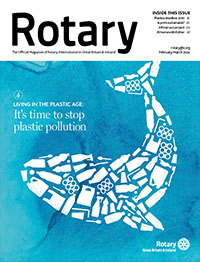Scientists and naturalists, such as Sir David Attenborough, as well as governments globally, all seem to agree there is an accelerating environmental and climate crisis. So why, unlike with COVID-19, are we doing so little about it?
At the Norfolk Climate Change Conference, we heard a powerful five-minute presentation from Dr Hayley Pinto, a psychiatrist, who is a speaker on climate change for Greenpeace and who has a special interest in oceans.
She succinctly explained how our evolution enables us to respond to COVID-19 as an urgent threat, but not respond to the far more serious distant threat of climate change.
🌎The first Norfolk Climate Change conference organised by Norfolk Rotarian, Willem Buttinger, proved to be a major success.@Norf_Clim_Conf #PeopleOfActionhttps://t.co/ktiwOsISxl
— Rotary GB & Ireland (@RotaryGBI) November 10, 2020
Rotary’s seventh area of focus is the environment and what more deserving cause can there be for all of us than to try and secure a habitable planet for the generations already with us and the ones to come? What legacy will we leave?
Now it makes no sense to separate climate change from the unfolding environmental crisis. The two are intimately connected. We need to work towards a sustainable future one that may give us a healthier planet and happier people.
The strategy both locally and globally must be threefold:
- To reduce our carbon footprint to zero.
- Plan for and adapt to the warming planet.
- Reduce the environmental damage.
Rotary must help with this by encouraging members to make changes to their lifestyles, educating their immediate and wider community, supporting projects with the aim of living sustainably for a healthier planet.
Rotary’s seventh area of focus is the environment and what more deserving cause can there be for all of us than to try and secure a habitable planet for the generations already with us and the ones to come? “
From my work with the Norfolk Climate Change Conference, it was clear to me that there are numerous numbers of individuals and organisations working towards these environmental aims, but these efforts are underplayed because of the lack of co-ordination.
Rotary’s unique, non-political, local, national and international reach gives us a marvellous opportunity to draw in partners at all levels to collaborate on these initiatives.
So, let’s get specific with things which you could do:
- Run educational webinars: I am working on one a bold vision for a healthier and happier sustainable future. Webinars educate the public and enhance Rotary’s standing in the community.
- Reduce your carbon footprint: www.giki.earth will give one a personal carbon score. District Environment Officer, Keith Tovey, has looked at the carbon footprint for Norwich Rotary, where he is a member, with a view to providing feedback to encourage club members to travel less.
- Working with the community: www.greening-campaign.org has a toolkit and offers help. Its motto is: “We began to destroy our world by making small changes to our lifestyles over the last 100 years. If we each make small changes to be greener and cleaner, those changes will again add up to make a healthy, richer happier future. We owe it to ourselves, future children, and our planet.”
- Join Rotary’s Environment
Find out more from the Sustainability Action Group.



























































